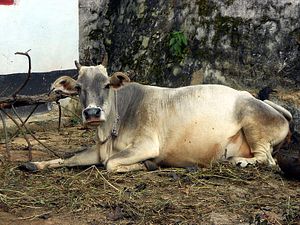Under India’s Prevention of Cruelty to Animals Act, the government of New Delhi and the Environment Ministry passed a notification effectively disallowing the mass sale of cattle for slaughter in animal markets. Demanding an undertaking from sellers that the cattle are only being sold for agricultural purposes and significantly complicating both the paperwork and the very process of sale of cattle meat, this ruling caused an uproar that only grows louder as the weeks go by.
Beef in particular has been a contentious issue that has complicated traditional religious and cultural fault-lines. Since the Bharatiya Janata Party (BJP) under Prime Minister Narendra Modi came to power three years ago with cow protection as an important part of its platform, the battle over beef has never really left the public conversation. Individuals have been targeted in states that have banned or are considering bans against cow slaughter on mere suspicion of beef possession. Armies of religious crusaders commonly referred to as gau rakshaks or “cow protectors” have both verbally and physically become more comfortable with aggression in the face of beef. Against such a tense backdrop, this notification has created a furor.
Meat sellers and exporters who have long feared steps towards a full-fledged beef ban have already touted this as one. The central government, however, has clarified on more than one occasion that the implementation of this ruling is still the prerogative of individual states, and that this is not an outright beef ban, but a restriction on the slaughter of agricultural cattle. While legally this might be true, as a Kerala high court observed, in practice the lines are not quite as clear.
While aversion to beef is not by itself synonymous with Hinduism, several groups within the religion, particularly within upper caste echelons, culturally perceive the cow as sacred. Meat, and beef in particular, however has been an important part of both the diet and culture for Christians and Muslims in India. Additionally, the sale of beef has been an important source of livelihood for Dalit and tribal communities in particular states. This notification, when read as a strategic attempt at curbing the available sources of sale and purchase of beef, appears to be against the interests of these minority groups in India.
Leading the protest against this notification was the state of Kerala where some of the earliest so-called beef fests were held in defiance of the government. Matching Kerala’s enthusiasm is West Bengal, whose Chief Minister Mamata Banerjee called the legislation undemocratic and unconstitutional. Both the states’ leaders have also explicitly indicated that in addition to being targeted at particular communities and food cultures, this also serves as an attempt to take power away from state units in the federal system. Bihar backed this line of thought, declaring that states had not been taken into confidence, and a high court in Tamil Nadu even placed a four-week stay on the notification.
While the southern states have been more demonstrative in their protests, the northeastern states, where beef is an important part of the cuisine, have been quite upset too. States have either entirely disregarded the notification as inapplicable, or expressed much discomfort with it. A BJP district president in Meghalaya, Bernard Marak, even quit the party after calling the move an ideological imposition. In Goa, BJP’s national spokesperson had to handle a clamor of questions regarding the ban and ultimately abruptly left the press conference.
Within a week of the announcement, the central government clarified that it was open to suggestions made by groups opposing it and was reviewing petitions. However response from the central government against the mass agitation within states has taken two directions. The first is to clarify and call it a “non ban,” without providing any sort of reassurance that a full ban will not be sought. It is hard to forget in this context that the BJP’s ideological mentor the Rashtriya Swayamsevak Sangh (RSS) has reiterated at several points its call for a national ban on cow slaughter. The second is explaining that states still had leeway over implementation, without exactly going into how center-state power sharing would work out in such a situation. The BJP’s earnest assurances that this was not aimed at targeting any individual group never once contend with the fact that a disproportionate number of minority communities closely work with cattle meat.
The protests against this notification have been the sites of polarity and discord. Protesters have sought spectacles like public cow slaughter and, in retaliation, even the more peaceful protests have often begotten violence. The need for both sides to descend into these condemnable forms of aggression stems from one important source: silence.
Silence on the part of the ruling elite regarding the methods employed by those who profess to be their supporters; silence regarding the question of what would actually stop the self-declared cow protection agenda from devolving into a beef ban; silence in the face of statistics that depict the religious and caste based skews in cattle meat related professions; silence in the face of a gripping fear that an attempt to dictate and impose who can consume what foods is underway – and things will not end there.

































